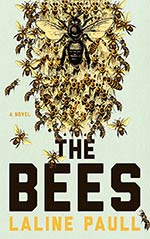
![]() ecnef
ecnef
9/28/2014
![]()
From the moment she emerges out of her cell Flora 717 is not like the other bees. She has been born a sanitation bee, meant to clean and to take orders from all other orders of bees. But unlike her sisters she can talk. And soon she learns that she can be more. She can nurse and forage. She can become more than what she was born into.
But the bees of her hive live according to order and caste. The Sage sisters, the priestesses of the hive seem to have plans of their own, and in this time of shortage and uncertainty are they damaging the good of the hive? Or is the actions of Flora 717 that are so terrible?
I'm sure the very premise of this book is off-putting to some. How could someone write an entire book about the fictionalised life of a bee? And een if they did, why would anyone read it?
Well, that second one is an easy one to answer, because it isn't every day that a novel has a bee as its hero. The unusual often grabs people's attention. Yes, some may be put off by it, but I'm sure that most of those who read the book will enjoy it. I know I did.
The first thing you learn when reading The Bees is that Flora is a bee. She isn't a human dressed up as a bee. She behaves according to instinct and chemical prompting. Her reactions and actions are not what a person might or might not do, although of course they are actions created by a human mind. Still, in many ways her world is utterly alien to the human world.
Which makes the book all the more entertaining if you ask me.
There is a rigid caste system1 which means that you can read this book as a commentary on human society and tyrannical power systems. There are hints of racism and prejudice everywhere. Every insect but bees are unclean and looked down on by the bees. And the different castes within the hive look down and compete with one another for power, if high ranking enough.
There is intrigue and action. Some of it very bloody and graphic, but that is nature in operation.
I originally decided to read this book because the author, Paull, is the British daughter of first-generation Indian immigrants and so it fitted into my Diverse Universe reading. Unfortunately I didn't get it finished in time but I'm still really glad to have read it. It is a book that delights in being different from the usual human-centered stories. And it also highlights some of the plights of the honeybee today; pesticides, single crop farming, lack of native plants etc.
http://www.susanhatedliterature.net/2014/09/the-bees/